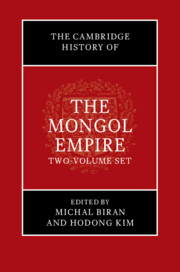Book contents
- The Cambridge History of the Mongol Empire
- The Cambridge History of the Mongol Empire
- Copyright page
- Dedication
- Contents
- Figures in Volume I
- Figures in Volume II
- Maps in Volume I
- Maps in Volume II
- Tables in Volume I
- Contributors to Volume I
- Contributors to Volume II
- Acknowledgments
- Notes on Dates and Transliterations
- Abbreviations
- Volume I
- Volume II
- Volume II Part 1 Literary Sources
- Volume II Part 2 Archaeological and Visual Sources
- 17 Archaeological Sources
- 18 Archaeological Sources
- 19 Archaeological Sources
- 20 Archaeological Sources
- 21 Visual Sources
- Index to Volume I
- Index to Volume II
- References
20 - Archaeological Sources
The Chaghadaid Khanate
from Volume II Part 2 - Archaeological and Visual Sources
Published online by Cambridge University Press: 01 January 2024
- The Cambridge History of the Mongol Empire
- The Cambridge History of the Mongol Empire
- Copyright page
- Dedication
- Contents
- Figures in Volume I
- Figures in Volume II
- Maps in Volume I
- Maps in Volume II
- Tables in Volume I
- Contributors to Volume I
- Contributors to Volume II
- Acknowledgments
- Notes on Dates and Transliterations
- Abbreviations
- Volume I
- Volume II
- Volume II Part 1 Literary Sources
- Volume II Part 2 Archaeological and Visual Sources
- 17 Archaeological Sources
- 18 Archaeological Sources
- 19 Archaeological Sources
- 20 Archaeological Sources
- 21 Visual Sources
- Index to Volume I
- Index to Volume II
- References
Summary
The archaeological study of Chaghadaid material culture began in the second half of the nineteenth century, after the annexation of Central Asia to the Russian Empire. The main archaeological sites on the territory of the Chaghadaid Ulus consisted of settlements. Judging by the numismatic data, the largest cities of the ulus were Almaliq (China), Pulad (China), Samarqand (Uzbekistan), Bukhara (Uzbekistan), Otrar (Kazakhstan), Shash (Uzbekistan), Taraz or Talas (Kazakhstan), Khujand (Tajikistan), Andijan (Uzbekistan), and Tirmidh or Termez (Uzbekistan). Archaeologists have studied the nomadic burials of the Chaghadaid period in Kazakhstan. Features of the funeral rites indicate the preservation of pagan traditions in the nomadic environment (for instance the ritual of burning corpses, sepulchral mounds, the remains of funeral food, horse harnesses). The erection of mausoleums reflects the Islamization process of the Chaghadaid Ulus. Among the Chaghadaid-period epigraphic monuments, Christian tombstones are the most apparent.
Keywords
- Type
- Chapter
- Information
- The Cambridge History of the Mongol Empire , pp. 1340 - 1348Publisher: Cambridge University PressPrint publication year: 2023

